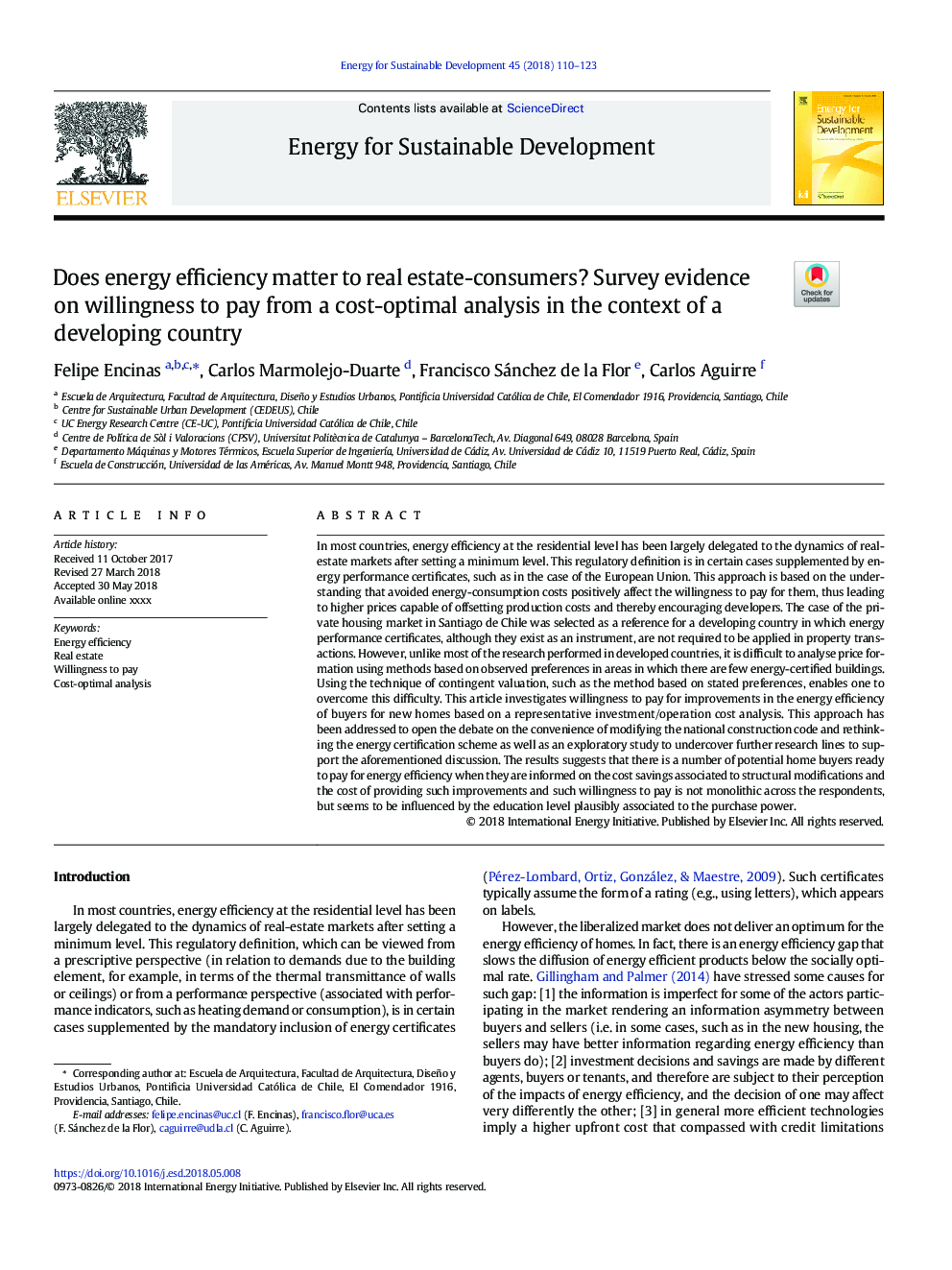| کد مقاله | کد نشریه | سال انتشار | مقاله انگلیسی | نسخه تمام متن |
|---|---|---|---|---|
| 7453494 | 1484385 | 2018 | 14 صفحه PDF | دانلود رایگان |
عنوان انگلیسی مقاله ISI
Does energy efficiency matter to real estate-consumers? Survey evidence on willingness to pay from a cost-optimal analysis in the context of a developing country
ترجمه فارسی عنوان
آیا مصرف انرژی برای مصرف کنندگان املاک و مستغلات مهم است؟ شواهد تحقیق در مورد تمایل به پرداخت از یک تجزیه و تحلیل هزینه بهینه در زمینه کشور در حال توسعه
دانلود مقاله + سفارش ترجمه
دانلود مقاله ISI انگلیسی
رایگان برای ایرانیان
کلمات کلیدی
بهره وری انرژی، مشاور املاک، تمایل به پرداخت، تجزیه و تحلیل هزینه-مطلوب،
ترجمه چکیده
در بیشتر کشورها، بهره وری انرژی در سطح مسکونی تا حد زیادی به دینامیک بازارهای املاک و مستغلات پس از تنظیم حداقل سطح، اعطا شده است. این تعریف قانونی در موارد خاصی است که توسط گواهی های عملکرد انرژی افزوده می شود، مانند در مورد اتحادیه اروپا. این رویکرد مبتنی بر درک است که هزینه های صرفه جویی در مصرف انرژی مثبت بر تمایل به پرداخت هزینه های آنها تاثیر می گذارد، و به این ترتیب قیمت های بالاتر را قادر به جبران هزینه های تولید و در نتیجه تشویق توسعه دهندگان. مورد بازار مسکن خصوصی در سانتیاگو دو شیلی به عنوان یک مرجع برای یک کشور در حال توسعه انتخاب شد که در آن گواهی های عملکرد انرژی، هرچند که به عنوان یک ابزار وجود دارند، مورد نیاز نیست که در معاملات ملک مورد استفاده قرار گیرد. با این حال، بر خلاف بسیاری از تحقیقات انجام شده در کشورهای توسعه یافته، تجزیه و تحلیل قیمت ها با استفاده از روش های مبتنی بر ترجیحات مشاهده شده در مناطقی که ساختمان های دارای گواهینامه چندانی وجود دارد، تحلیل می شود. با استفاده از تکنیک ارزیابی احتمالی، مانند روش مبتنی بر ترجیحات اظهار شده، فرد توانست بر این مشکل غلبه کند. این مقاله به بررسی تمایل به پرداخت هزینه های بهبود بهره وری انرژی خریداران برای خانه های جدید بر اساس یک تحلیل هزینه سرمایه گذاری مستقیم / عملیاتی می پردازد. این رویکرد برای باز کردن بحث در مورد راحتی تغییر کدهای ساخت و ساز ملی و بازنویسی طرح صدور گواهینامه انرژی و همچنین یک مطالعه اکتشافی برای کشف خطوط تحقیق بیشتر برای حمایت از بحث فوق ذکر شده است. نتایج نشان می دهد که تعدادی از خریداران بالقوه خانه آماده پرداخت برای بهره وری انرژی هستند زمانی که آنها در صرفه جویی در هزینه های مربوط به تغییرات ساختاری و هزینه ارائه چنین پیشرفت هایی اطلاع دارند و این تمایل به پرداخت در تمام پاسخ دهندگان یکپارچه نیست، اما به نظر می رسد تحت تأثیر سطح آموزش قابل اعتماد به قدرت خرید است.
موضوعات مرتبط
مهندسی و علوم پایه
مهندسی انرژی
انرژی (عمومی)
چکیده انگلیسی
In most countries, energy efficiency at the residential level has been largely delegated to the dynamics of real-estate markets after setting a minimum level. This regulatory definition is in certain cases supplemented by energy performance certificates, such as in the case of the European Union. This approach is based on the understanding that avoided energy-consumption costs positively affect the willingness to pay for them, thus leading to higher prices capable of offsetting production costs and thereby encouraging developers. The case of the private housing market in Santiago de Chile was selected as a reference for a developing country in which energy performance certificates, although they exist as an instrument, are not required to be applied in property transactions. However, unlike most of the research performed in developed countries, it is difficult to analyse price formation using methods based on observed preferences in areas in which there are few energy-certified buildings. Using the technique of contingent valuation, such as the method based on stated preferences, enables one to overcome this difficulty. This article investigates willingness to pay for improvements in the energy efficiency of buyers for new homes based on a representative investment/operation cost analysis. This approach has been addressed to open the debate on the convenience of modifying the national construction code and rethinking the energy certification scheme as well as an exploratory study to undercover further research lines to support the aforementioned discussion. The results suggests that there is a number of potential home buyers ready to pay for energy efficiency when they are informed on the cost savings associated to structural modifications and the cost of providing such improvements and such willingness to pay is not monolithic across the respondents, but seems to be influenced by the education level plausibly associated to the purchase power.
ناشر
Database: Elsevier - ScienceDirect (ساینس دایرکت)
Journal: Energy for Sustainable Development - Volume 45, August 2018, Pages 110-123
Journal: Energy for Sustainable Development - Volume 45, August 2018, Pages 110-123
نویسندگان
Felipe Encinas, Carlos Marmolejo-Duarte, Francisco Sánchez de la Flor, Carlos Aguirre,
